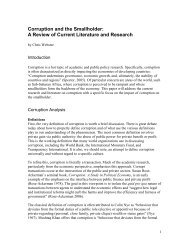13th Annual International Management Conference Proceeding
13th Annual International Management Conference Proceeding
13th Annual International Management Conference Proceeding
You also want an ePaper? Increase the reach of your titles
YUMPU automatically turns print PDFs into web optimized ePapers that Google loves.
Source: GOK, Central Bureau of Statistics (CBS) <strong>International</strong> Center for Economic Growth (ICEG) and K-Rep<br />
Holdings Ltd., (1999:44). National Micro and Small Enterprise Baseline Survey 1999. Nairobi, Kenya.<br />
Table 5 shows that some entrepreneurs reported training requirements in areas that KIA can provide.<br />
The survey also established a relationship between membership in business associations and education. The<br />
distribution of entrepreneurs by association membership showed that many are university graduates (GOK, 1999) who<br />
are also the main KIA trainees (KIA 2001 - 2006). Gibb, (2002) opines that networking is an important component<br />
in enterprise culture, which provides members with potential for business contacts, protection, promotion of business<br />
interests, assistance and avenue for advancement. Network creation and sustenance is one of the Modules popularly<br />
taught in KIA progrommes.<br />
4.3 KEY ISSUES AND CHALLENGES IN ENTERPRISE CULTURE DEVELOPMENT<br />
Given the dynamic society in which KIA operates, the Institute takes cognizance of the continued challenge<br />
posed in the process of positioning itself at the cutting edge of new developments in management practices<br />
and governance issues with regard to provision of training, research and consultancy services. Several issues<br />
and challenges arise out of the role of KIA as part of the entrepreneurial support system as shown below:<br />
4.3.1 Why Kenya lacks an Enterprise Culture<br />
It is clearly evident that in some societies, some people aspire to business ownership than others. Arguably,<br />
this does not result from intrinsic personality differences, but existence of stronger enterprise culture (ILO,<br />
2001). The creation of an enterprise culture needs wider and more fundamental changes in<br />
Entrepreneurship Development Programmes (EDP). The following reasons why Kenya lacks a developed<br />
enterprise culture are presented with reference to the components of enterprise culture as given by Gibb<br />
(1988):<br />
4.3.2. Abundant positive role images<br />
Kenya suffers from scarcity of positive role images of successful independent businesses (Mullei 1999, GOK,<br />
2005). The country has suffered from high level of corruption. This makes many people associate business<br />
success with this vice (GOK, 2005). KIA has been giving an input integrity issues in the training<br />
programmes<br />
4.3.3 Opportunity to practice entrepreneurial attributes<br />
The opportunity to practice entrepreneurial attributes is reinforced by society culture during the formative<br />
years. However, the Kenyan culture doesn’t stand failures. Mostly, business failures are not given a second<br />
chance. Failure is not seen as opportunity for the lessons learnt which causes self-blame. Yet, these MSEs<br />
have “… a high mortality rate with most of them not surviving to see beyond their third anniversaries”<br />
(GOK, 2005:6).<br />
Further, some people who are good at identifying business opportunities, but not courageous enough to take<br />
risks to convert them into businesses are not encouraged by society. Many Kenyans have negative attitudes<br />
and attach a social stigma to being in business, and business attempts are mostly taken as second best after<br />
academic failure. The first-rate academic performers are socialized to work for blue-chip corporations in<br />
white color jobs (Mullei, 1999). This discourages Kenyans to entrepreneurial practice.<br />
4.3.4 Ample opportunity for familiarization with small businesses<br />
Familiarization with small businesses tasks especially during youth in a country faced with high level of<br />
unemployment is not possible. Further, many businesses do not give youth a chance to experience<br />
entrepreneurship. This is reflected in the lack of a clear government policy on industrial attachments.<br />
Practically, KIA gives opportunities for industrial attachments, but further input is required at policy level.<br />
4.3.5 Network of independent business/family contacts and acquaintances<br />
Success in the world today calls for collaboration with different organizations (Khanka, 2004), but Kenya<br />
has many business Associations A network of independent business/family contacts and acquaintances<br />
reinforcing familiarity and providing market entry opportunities is impractical in a country that suffers from<br />
lack of abundant role models. Additionally, most business related networks are young with low membership<br />
24
















